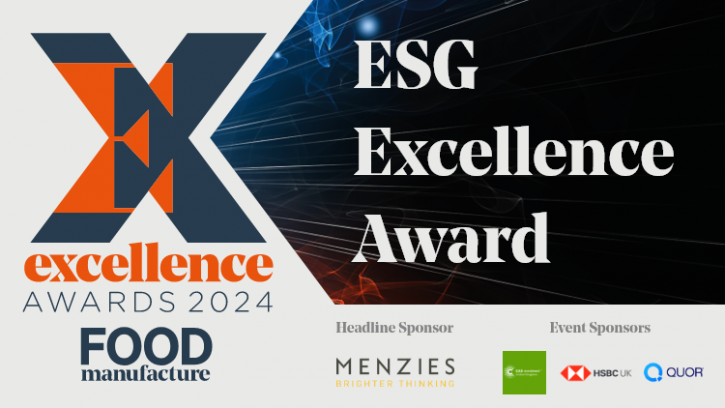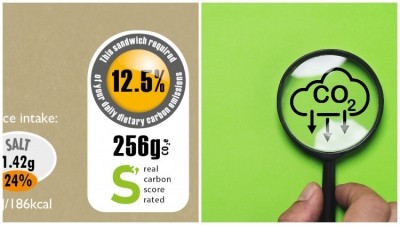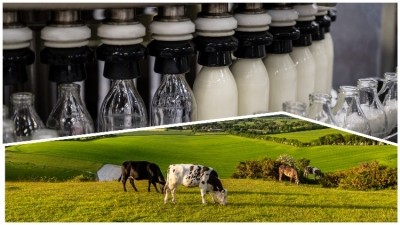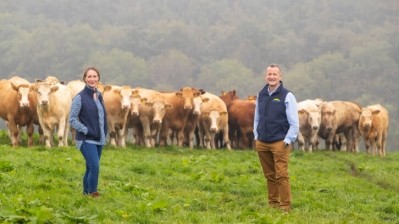News
Meet the finalists: ESG Excellence Award

Arla Foods
Arla launched its sustainability strategy in 2019, with an aim of being carbon net zero across its entire value chain by 2050.
As a dairy cooperative owned by 2,100 British farmers who supply milk to make its products, its farmers are extremely engaged in the sustainability of the business and its environmental strategy.
Most of the emissions associated with producing milk takes place at farm level and so, alongside decarbonising its operations (i.e., production and logistics), the business is working hard to support its farmers in lowering their carbon footprint of milk production.
“We're extremely proud of the work we're doing to reduce our impact in all aspects of our business, but especially our work on farm. By measuring our impact, identifying the most effective activities to drive change, and incentivising these actions, we believe we are leading the sustainable dairy agenda in the UK,” its application read.
Arla was one of the first dairy companies to have these targets verified by the Science-Based Target initiative (SBTi) as being consistent with action required to achieve 1.5°C. Additionally, it is heavily involved in the Dairy UK Roadmap, a pioneering, cross-industry initiative that sets ambitious targets for environmental improvements within the industry, including metrics for water use, energy efficiency, biodiversity and more. In 2021, the UK Dairy Roadmap raised its ambitions further, committing to (and outlining plans for) net zero by 2050. Since its launch in 2008, the roadmap has delivered a 24% cut in milk production greenhouse gas emissions, 18% improvement in energy efficiency, 24% increase in water use efficiency, and reducing landfill waste to 4%.
In striving to achieve Net Zero by 2050, Arla Foods aims to reduce its scope 1 and 2 emissions by 63% by 2030 (vs. 2015 baseline). In the UK, it has come a long way in this journey – from 2015 to 2021, it has reduced emissions across its supply chain by 24% in production and on sites, by 25% in transport and logistics and by 18% in packaging.
Its sustainability goals also include making its milk bottles fully circular by 2030. Arla was first in the UK with an ultralight ‘ecobottle’ and since 2015 it has reduced plastic in its milk bottles by 26%.
Back in 2012, the company also became the first major dairy in the UK to achieve zero waste to landfill throughout its entire UK business and all its sites by maximising solid waste recycling and using waste product for animal feed and biogas production.
The company is also a longstanding partner of FareShare, a charity that helps it redistribute surplus dairy products. Its purchasing policy sets out 11 principles for purchasing in Arla to ensure a clear and uniform process when buying goods and services. This was revised and further strengthened in 2022 in areas related to climate, health and safety and labour rights.
Among its partnerships, the business has also been working with Magic Breakfast, a charity aiming to end hunger as a barrier to learning in UK schools. So far, it has provided over 950,000 milk donations to schools across the UK.
In 2022, the company merged its Sustainability Report with the finance-focused Annual Report, bringing sustainability even closer to its core business strategy. The new report now includes company’s performance, strategy, and governance, as well as externally audited ESG figures, a detailed review of Arla’s sustainability results from the whole value chain, and how Arla works with social, ethical, and environmental commitments.
Dunbia
Sustainability has been central to Dunbia’s business strategy for over 20 years, and the company has aligned and collaborated with customers, suppliers and other stakeholders who share this ethos.
Dunbia’s ambition is to become Europe’s most sustainable meat producer and to provide consistent quality meat products from sustainable sources to support its rural communities, human health, and nature’s eco-system.
“We believe sustainability means taking responsibility for the impact our business has on the world, building trust in our brands as well as making us an efficient and modern business. We recognise that the long-term financial sustainability of our business is dependent on the health of our natural world, and on the wellbeing of society. We need to conserve our water and energy, while reducing our emissions and waste, support our rural communities and ensure our products make a valuable contribution to human nutrition,” its entry read.
In November 2019, the business became the first European Beef and Lamb processor to have our Science-Based Targets (SBT) approved. By 2030 from a 2016 baseline, it has committed to reduce scope 1 and 2 absolute emissions by 30% and scope 3 emissions intensity by 28% per tonne of finished product.
It has been a zero waste to landfill business for many years. In 2020, 50% and 32% of all waste generated in Ireland and UK respectively was recycled. Food waste within its operations was less than 1% of its finished product.
Moreover, as members of WRAP’s Courtauld Commitment and Meat in a Net Zero World, it is working as part of the national collective goal to reduce food waste in the UK by 50% by 2030. As strategic partners to the UK Food Waste Action Week, it has also donated 125,000 meal portions to people in need.
Employees are also encouraged to support its communities and throughout the Covid-19 pandemic, team members volunteered for over 4,300 hours and raised more than €1.1m.
Its Diversity, Equity and Inclusion Plan governs its approach to recruitment and talent development, managing the workplace environment, employee engagement and retention and health and wellbeing.
“Our people are our most important asset and we work hard to build and maintain an inclusive workplace for our diverse team of over 40 nationalities.”
Dunbia’s sustainability report published online covers progress between 2019 and 2021, including resource management, sustainable sourcing, animal welfare, people and community, and food safety.
Mindful Chef
Mindful Chef was founded with a mission to make healthy eating easy and it considers this to be ‘deeply linked to sustainability and ESG’.
As it describes in its application: “What we eat directly impacts both our human health (and societal health), as well as planetary health”. As such, three core pillars uphold its brand and offering: health, quality and sustainability.
In 2018, it was the first recipe box to become a certified B Corp. As a growing business this provided the business with a framework for how to positively impact all stakeholders: its team, suppliers, customers, community and the environment.
Care and consideration for all stakeholders is now deeply tied into everything it does. From its sourcing standards and the shared values it expects from suppliers, to aligning its recipes to The Planetary Health Diet, to its commitment to go beyond wherever it can - including donating meals to children living in poverty, organising annual community events, and driving change through innovative projects like carbon labelling.
Today, Mindful Chef is now one of the highest rated food B Corps in the UK and in the top 3% globally.
Last year, it set the goal of becoming a regenerative business which goes beyond sustainability goals and supports an entire ecosystem of change.
“As a food business we’re acutely aware of our environmental impact. Our two major carbon footprint hotspots are ingredients (68%) and packaging (16%). Therefore, whilst our strategy looks across our whole value chain these are the areas we must focus on.”
Mindful Chef’s strategy is split into the changes it makes itself and ways in which it can educate and influence by partnering with others. For example, when it comes to ingredients and impact, changes around introducing more plant-based meals and red meat alternatives have been implemented. The company has also set up its Regenerative Farming Program which supports its suppliers’ transition to regenerative practices.
Mindful Chef was also the first recipe box globally to introduce carbon labelling. Its low carbon range helps educate customers on the impact of particular recipes so they can make more educated selections and help drive down the impact of food choices.
Moreover, in 2017, the company partnered with One Feeds Two and started donating a meal to a child living in poverty for every meal sold. It has now donated over 18 million meals. It has also organised annual events, such as a national clean up, harnessing the power of community.
When it comes to measuring and reporting, the business does this in a few ways. It has set up an overarching target to reach net zero by 2030 and an annual carbon intensity reduction target which it is currency exceeding. The business also has other ESG-related KPIs, such as packaging recyclability and food surplus. These targets are reported on internally through a monthly impact report.
Success of community events are measured by their reach (e.g. how many people take part in a clean-up, how much litter is collected etc.). Since launching the clean-up project in 2018, it has collected over 360,000 litres of rubbish.
Mindful Chef also produces an annual sustainability report, which transparently shares progress towards its goals. This is shared among all stakeholders, but for its customers it also shares a year in review, where their own personal contributions e.g. the number of low carbon meals they ate, the amount of meals they donated etc., is broken down.
Finally, as an external measure of success, the company uses its B Corp score. In its recent re-certification (these occur every three years), the company increased its overall score by 33%.
Moo Free
Moo Free is a family-run business that has been leading the charge on ‘dairy-dodging’ chocolate for over a decade. The business was founded by husband-and-wife team Mike and Andrea Jessop. When their son was born with a dairy intolerance in 1982, they gained a vital insight into the world of living with food allergies. They used this knowledge to launch the UK’s first dairy and gluten free chocolate Advent calendars and Easter eggs, and their Moo Free confectionary business was born.
The Jessops have made it their mission to ensure that no child – no matter what their allergy, should be left out from enjoying chocolate confectionery that won’t make them unwell. They are passionate about diversity and inclusion and the founders have ensured that the culture at Moo Free sees all people as individuals with their own special ways, who all deserve a chance.
The business has very strong ethics surrounding the environment, sustainability and corporate governance – not just within the products it creates, but for the wider community in which it operates. For example, it sources all ingredients ethically and sustainably, the cocoa is Rainforest Alliance certified; and where it can it sources ingredients and packaging in the UK. In the last year, the business has become B-Corp Certified and achieved a BRC AA* accreditation.
All packaging is fully recyclable and made using recycled materials at Moo Free. The company always re-uses packaging and boxes where it can to – and any packaging that cannot be re-used is recycled and sent to a local plant. All redundant waste plastic film is converted into damp course membrane for the UK building industry.
Meanwhile, all food waste is segregated and sent to an anaerobic digestion plant less than a mile away. This waste is converted into two products – fertiliser and biogas, which is used to generate electricity and exported to the national grid.
Moo Free has moved its energy supplier to all renewable sources. All the company cars are electric, charged using electricity produced by its solar panels.
The business has strong ethics surrounding equality, diversity and sustainability – not just within the products it creates, but for the wider community. Moo Free partners with local charities to provide work experience and permanent roles to those with disabilities. The team includes employees of all age groups, an equal mix of men and women and several people on the autistic spectrum. Moo Free regularly donates chocolate to Food Banks and local charities, and many of the staff support local charity events.
The company also consistently incorporates social and environmental impact into its decision-making, as it considers it crucially important to the success and profitability of the business.
Moo Free has completed the B Impact assessment which has highlighted areas the business is strong in and provided areas of focus to improve on. Moo Free uses this framework to monitor its success and as a benchmark to self-reflect and implement changes that will allow the business to continue to grow and progress.
“Achieving B-Corp status at the beginning of the year was a great achievement for Moo Free and has also helped shape the ESG strategy going forward. It has enabled the business to recognise what it does well and highlight areas of focus for the future for constant improvement. As a business, Moo Free is always open to adapting its approach in order to develop and improve its ESG strategy,” its application read.
The winners will be announced at the Food Manufacture Excellence Awards 2024, which will take place on Thursday 8 February at the London Hilton Bankside. Tickets are available to purchase, here.
Interested to see the entire shortlist of finalists for all 2024 categories? Click here.
The Food Manufacture Excellence Awards are proudly sponsored by our headliner Menzies, alongside event sponsors Quor, HSBC, and CAS Recruitment.

















